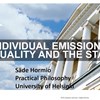permission
Subsistence Emissions and Climate Justice
British Journal of Political Science Abstract The climate justice literature typically endorses a moral right to produce subsistence emissions, but this right appears problematic considering how urgent
Domain-specific tightness: Why is Sweden perceived as tighter than the United States?
Current research in ecological and social psychology, vol 3 Abstract The tightness of a society is defined as the strength of social norms and the degree of sanctioning within the society. However, a so
Sex Selection for Daughters: Demographic Consequences of Female-Biased Sex Ratios
Population Research and Policy Review 41, p. 1619–1639 Abstract Modern fertility techniques allow parents to carry out preimplantation sex selection. Sex selection for non-medical purposes is legal in m
The Liberal Social Values of Swedish Healthcare Providers in Women’s Healthcare: Implications for Clinical Encounters in a Diversified Sexual and Reproductive Healthcare
International Journal of Public Health Abstract Objectives:Women’s healthcare is a potential source of cross-cultural conflicts. Diverging values between healthcare providers and patients challenges the
H. Orri Stefánsson - What is the point of private offsetting?
H. Orri Stefánssonis Associate Professor (Docent) of Practical Philosophy at Stockholm University, Pro Futura Scientia Fellow at the Swedish Collegium for Advanced Study, and Researcher and Advisor at

What is the point of private offsetting?
H. Orri Stefánsson is Associate Professor (Docent) of Practical Philosophy at Stockholm University, Pro Futura Scientia Fellow at the Swedish Collegium for Advanced Study, and Researcher and Advisor a
Lukas H. Meyer: Fairness is most relevant for country shares of the remaining carbon budget
Lukas H. Meyer, Professor of Philosophy at the University of Graz, Austria, and Speaker of the Field of Excellence Climate Change Graz, the Doctoral Programme Climate Change, and the Working Unit MoraIn my talk I argue that fairness concerns are decisive for eventual cumulative emission allocations shown in terms of quantified national shares.I will show that major fairness concerns are quantitatively critical for the allocation of the global carbon budget across countries. The budget is limited by the aim of staying well below 2°C. Minimal fairness requirements include securing basic needs, attributing historical responsibility for past emissions, accounting for benefits from past emissions, and not exceeding countries’ societally feasible emission reduction rate. The argument in favor of taking into account these fairness concerns reflects a critique of both simple equality and staged approaches, the former demanding the equal-per-capita distribution from now on, the latter preserving the inequality of the status-quo levels of emissions for the transformation period. I argue that the overall most plausible approach is a four-fold qualified version of the equal-per-capita view that incorporates the legitimate reasons for grandfathering.
Power and future people’s freedom: intergenerational domination, climate change, and constitutionalism
"Power and future people’s freedom:intergenerational domination, climate change, and constitutionalism", Journal of Political Power, Volume 9, Issue 2, 2016, pp 289-307. Abstract Intergenerational domina

Säde Hormio: Individual emissions, equality and the state
Seminar with Säde Hormio, researcher in Practical Philosophy at the University of Helsinki. ABSTRACT The amount of greenhouse gases that can still be emitted to the atmosphere is very limited if global

Future generations
Climate change is the biggest challenge of our time, and in this theme there is a focus on future generations and their living conditions. We aim to examine among other things climate ethics, sustainable development, green growth, obstacles to climate action and social dilemmas.








